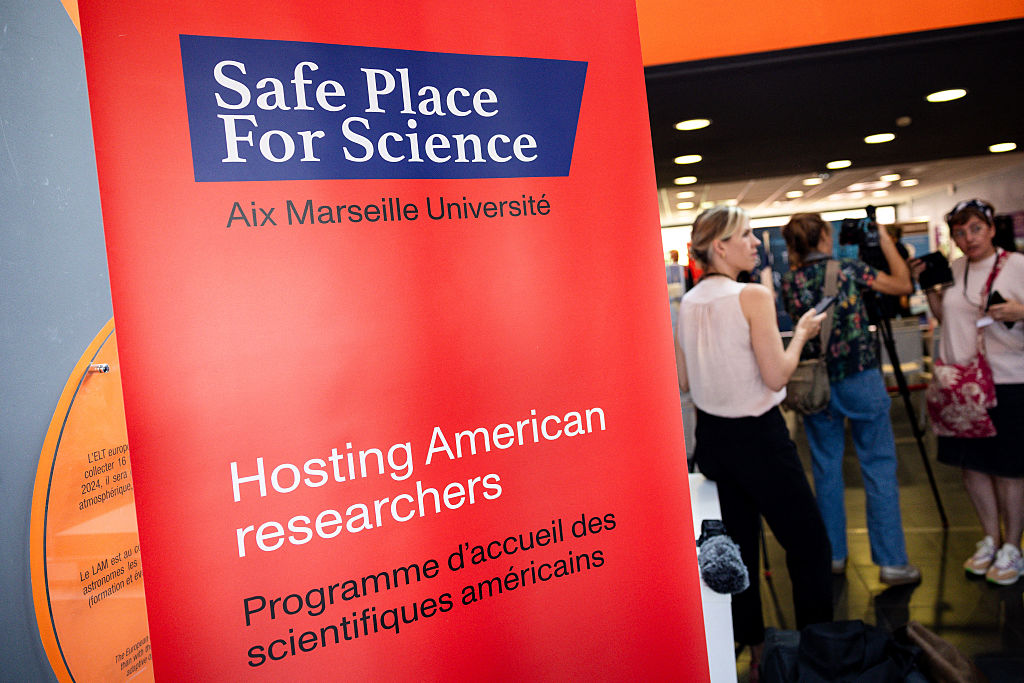On a recent flight back to the U.S., I wondered if I would be stopped at passport control. It was at this moment when I thought it may be time to consider leaving America.
[time-brightcove not-tgx=”true”]
I was returning from Marseille, France after participating in a workshop in March that I co-organized at the Iméra research institute on climate change and religious conflict during the Little Ice Age. The topic is now effectively banned from federal funding after the Trump Administration stripped support for scientific research that mentions the word “climate,” amid a broader purge of “woke” keywords in the federal government.
Iméra leaders had asked me to attend a meeting with university administrators and government ministers on the broad crisis in research and provide an American perspective. The event was much bigger than I had imagined, and there was a press conference, where I shared my criticisms of the Trump Administration’s assault on research and higher education.
For months, I have watched coordinated attacks on the National Endowment for the Humanities, Smithsonian Institution, Institute for Museum and Library Services, Fulbright Program, Woodrow Wilson Institute, U.S. Institute of Peace, Kennedy Center, USAID, Department of Education, National Science Foundation, National Institutes of Health, and other federal agencies that support academic research and education.
Read More: Inside the Chaos of Trump’s Foreign-Aid Freeze
I personally know many colleagues and former students who have had research funds and grants frozen or terminated, while others have lost jobs or contracts. Academic grant competitions and peer review processes are being politicized and disrupted, effectively censoring the types of research that can be pursued. When politicians—rather than professionals—can select which types of research can be funded and how that money can be spent based on their own preferences, the entire pursuit of knowledge is corrupted.
So when Aix-Marseille Université (amU) decided to launch a “Safe Place for Science” program, I became one of the 298 researchers who applied. After all, I was already due to spend one year there as a visiting professor, and the initiative promises three years of research funding. The university has invested €15 million for the program and is lobbying the French government to match that amount, so it can double its planned hires to 39 people.
The program comes amid a wider European push to attract American and international researchers who are based in the U.S. European Commission President Ursula von der Leyen has unveiled a €500 million program to make the continent a “safe haven” for researchers, and France has committed another €100 million.
There is certainly interest state-side, as the surge in applicants for amU’s program showed. Data analyzed by Nature also found that the number of applicants in the U.S. looking for jobs in Canada has climbed by 41%, in Europe by 32%, and in China by 20% compared to a year earlier. The Australian Strategic Policy Institute has even called the Trump Administration’s attacks on research a “once-in-a-century brain gain opportunity.”
It’s a stunning development, considering that the U.S. has long been a place of refuge for researchers and academics. In 1933, when Adolf Hitler consolidated power in Germany, leading scientists such as Albert Einstein fled the country. Later, during the Second World War, other intellectuals and artists fled occupied Europe, including Hannah Arendt, who notably escaped through Marseille with the help of American journalist Varian Fry.
Ever since, American research universities and laboratories have relied on an open system of international recruitment of the best and brightest from across the globe. The federal government has supported the development of this system by providing visas for faculty and students, as well as billions in funding through competitive, peer reviewed grants.
Read More: The Trump Administration Is Pausing Student Visa Interviews at Embassies
That approach helped turn the U.S. system of higher education into a model of excellence for the entire world.
These research universities have been informally linked with a broader network of regional state universities and small private colleges that often provide higher education to the public at relatively low cost for middle- and working-class Americans. The GI Bill of 1944, the expansion of regional state universities in the 1960s, and the evolution of community colleges since the 1970s have dramatically boosted access to higher education, becoming a key form of upward social mobility for millions of Americans.
These institutions have also served as a key plank in the civil rights movement and other forms of protest, meaning an assault on them will undermine free speech and assembly, as well as other democratic principles.
For now, I am on the shortlist at amU’s “Safe Place for Science.” Whether I am ultimately selected for a position or not, I foresee conducting research collaborations with French academics with French or E.U. funding in the coming years, considering that the entire U.S. sector has been thrown into disarray.
Packing up and relocating to France, or any other country, will be an adjustment. But it is clear that an era of U.S. brain drain is beginning, as researchers and scientists seek opportunities in places where academic freedom and research are still valued.

